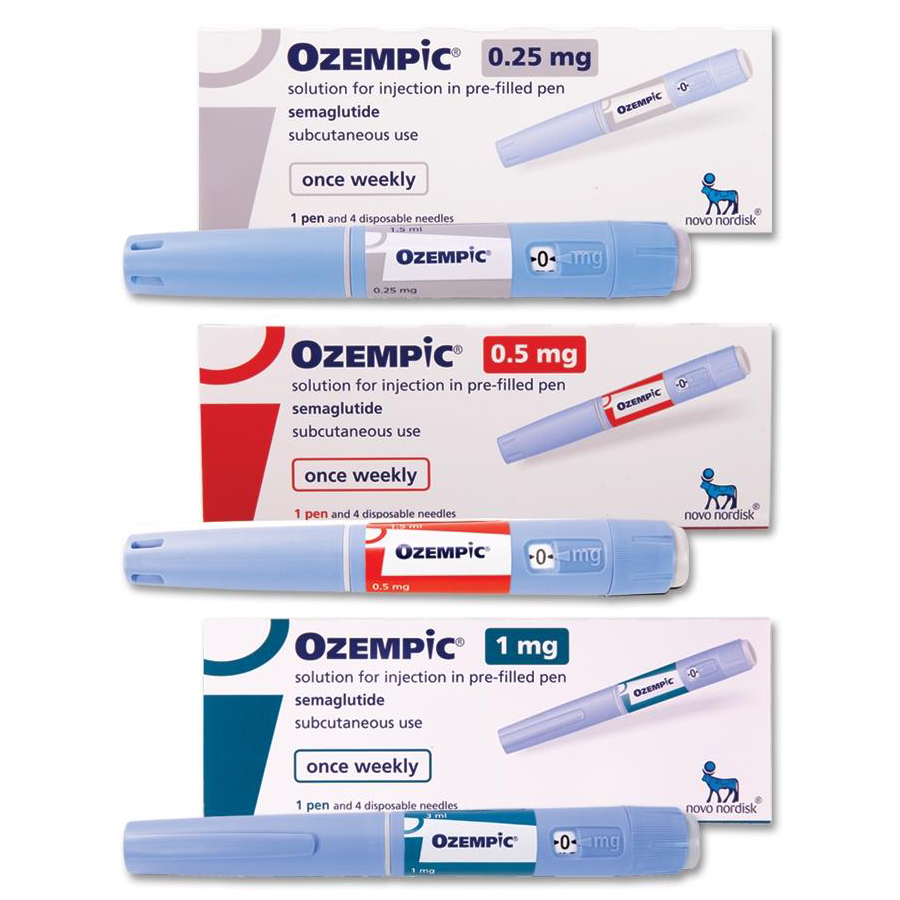
Warning: Risk of Thyroid C-Cell Tumors
In animal studies, Ozempic caused thyroid tumors, including thyroid cancer. It is not known if Ozempic will cause thyroid tumors or a type of thyroid cancer called medullary thyroid carcinoma (MTC) in humans. If you notice a lump or swelling in your neck, hoarseness, difficulty swallowing, or shortness of breath, tell your doctor immediately, as these may be symptoms of thyroid cancer.
Ozempic is contraindicated in individuals with a personal or family history of medullary thyroid carcinoma (MTC) or in patients diagnosed with Multiple Endocrine Neoplasia syndrome type 2 (MEN 2).
What is the approved use of Ozempic?
Ozempic is used in combination with a reduced-calorie diet and increased physical activity to improve blood sugar control in adults with type 2 diabetes. It may also be used to reduce the risk of major cardiovascular events in patients with type 2 diabetes and established cardiovascular disease.
Limitations of Use:
- Ozempic is not recommended for the treatment of type 1 diabetes or diabetic ketoacidosis.
- Ozempic should not be used together with other GLP-1 receptor agonists or insulin.
Who should not use Ozempic?
Do not use Ozempic if:
- You or any of your family have ever had medullary thyroid carcinoma (MTC) or if you have been diagnosed with Multiple Endocrine Neoplasia syndrome type 2 (MEN 2).
- You have a known allergy to semaglutide or any of the components in Ozempic.
- You are pregnant or planning to become pregnant. Ozempic should not be used during pregnancy.
How should I take Ozempic?
Ozempic is injected subcutaneously once a week in the abdomen, thigh, or upper arm. It is available as a pre-filled pen. You can take Ozempic at any time of day, with or without food. Ensure you take it on the same day each week.
It is important to follow the dosing instructions provided by your doctor. Do not change your dose or stop taking Ozempic without consulting your healthcare provider.
What should I tell my healthcare provider before using Ozempic?
Before using Ozempic, inform your healthcare provider about all your current medications, including prescription drugs, over-the-counter medicines, vitamins, and herbal supplements. Particularly, inform your doctor if you are using:
- Other medications for diabetes, such as insulin or sulfonylureas, which may increase the risk of low blood sugar when taken with Ozempic.
- Other GLP-1 receptor agonists, as these should not be used with Ozempic.
Additionally, tell your healthcare provider if you have or have had any of the following:
- Type 1 or type 2 diabetes
- Thyroid cancer or a family history of medullary thyroid carcinoma (MTC)
- Pancreatitis (inflammation of the pancreas) or other gastrointestinal diseases
- Kidney disease or dialysis
- Retinopathy (eye disease due to diabetes)
- Depression or any history of suicidal thoughts or behavior
- Any gastrointestinal conditions, including gastroparesis (delayed gastric emptying)
Pregnancy and Breastfeeding:
- If you are pregnant: Ozempic should not be used during pregnancy. Animal studies have shown potential harm to the unborn baby, and there is no benefit to weight loss or blood sugar control during pregnancy.
- If you are breastfeeding: It is not known whether Ozempic passes into breast milk. Discuss the potential risks and benefits with your doctor before using Ozempic while breastfeeding.
Pregnancy Registry: There is a pregnancy registry that monitors the outcomes of pregnancies exposed to Ozempic. Contact the manufacturer for more information if you are pregnant and have used Ozempic.
What are the most serious side effects that I or a caregiver should monitor for when taking Ozempic?
If you experience any of the following serious side effects, seek immediate medical attention:
- Thyroid C-Cell Tumors: Notify your doctor if you experience a lump or swelling in your neck, hoarseness, trouble swallowing, or shortness of breath, as these may be symptoms of thyroid cancer.
- Acute Pancreatitis: Severe abdominal pain that does not go away, sometimes radiating to the back, with or without vomiting, may indicate pancreatitis. Seek urgent medical help.
- Severe Gastrointestinal Issues: Nausea, vomiting, diarrhea, and constipation are common but can sometimes be severe. If these symptoms persist or worsen, consult your doctor.
- Acute Kidney Injury: Dehydration due to gastrointestinal side effects can lead to kidney problems. Stay hydrated to reduce the risk of dehydration.
- Allergic Reactions: Severe allergic reactions, such as swelling of the face, lips, tongue, or throat, or difficulty breathing, should be treated immediately. Stop using Ozempic and seek urgent medical attention.
- Low Blood Sugar (Hypoglycemia): If you are taking Ozempic with other diabetes medications, especially insulin or sulfonylureas, monitor for symptoms of low blood sugar such as dizziness, confusion, or sweating.
- Suicidal Thoughts and Behaviors: Monitor for any changes in mood or behavior, and contact your healthcare provider if you experience new or worsening mental health symptoms.
What are the most common side effects of Ozempic?
- Nausea
- Diarrhea
- Vomiting
- Constipation
- Stomach pain
- Indigestion
- Injection site reactions
- Fatigue
- Headache
- Decreased appetite
Reporting Side Effects:
You are encouraged to report any adverse effects of Ozempic to the China Food and Drug Administration (CFDA) or your healthcare provider.
This information is not comprehensive. Please refer to the full Prescribing Information for complete safety details.
